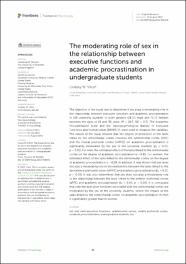| dc.contributor.author | Vilca, Lindsey W | es_ES |
| dc.date.accessioned | 2023-02-07T19:51:46Z | |
| dc.date.available | 2023-02-07T19:51:46Z | |
| dc.date.issued | 2022-08-22 | |
| dc.identifier.uri | https://hdl.handle.net/20.500.13053/7776 | |
| dc.description.abstract | The objective of the study was to determine if sex plays a moderating role in the relationship between executive functions and academic procrastination in 106 university students of both genders (28.3% male and 71.7% female) between the ages of 18 and 30 years (M = 19.7; SD = 2.7). The Academic Procrastination Scale and the Neuropsychological Battery of Executive Functions and Frontal Lobes (BANFE-2) were used to measure the variables. The results of the study showed that the degree of prediction of the tasks linked to the orbitomedial cortex (involves the orbitofrontal cortex [OFC] and the medial prefrontal cortex [mPFC]) on academic procrastination is significantly moderated by the sex of the university students (β3 = 0.53; p < 0.01). For men, the estimated effect of the tasks linked to the orbitomedial cortex on the degree of academic procrastination is -0.81. For women, the estimated effect of the tasks linked to the orbitomedial cortex on the degree of academic procrastination is -0.28. In addition, it was shown that sex does not play a moderating role in the relationship between the tasks linked to the dorsolateral prefrontal cortex (dlPFC) and academic procrastination (β3 = 0.12; p > 0.05). It was also determined that sex does not play a moderating role in the relationship between the tasks linked to the anterior prefrontal cortex (aPFC) and academic procrastination (β3 = 0.05; p > 0.05). It is concluded that only the executive functions associated with the orbitomedial cortex are moderated by the sex of the university students, where the impact of the tasks linked to the orbitomedial cortex on academic procrastination in men is significantly greater than in women. | es_ES |
| dc.format | application/pdf | es_ES |
| dc.language.iso | eng | es_ES |
| dc.publisher | Frontiers in Psychology | es_ES |
| dc.rights | info:eu-repo/semantics/openAccess | es_ES |
| dc.rights.uri | https://creativecommons.org/licenses/by/4.0/ | es_ES |
| dc.subject | academic procrastination; hot and cold executive functions; medial prefrontal cortex; orbitofrontal cortex; sex; undergraduate students. | es_ES |
| dc.title | The moderating role of sex in the relationship between executive functions and academic procrastination in undergraduate students | es_ES |
| dc.type | info:eu-repo/semantics/article | es_ES |
| dc.identifier.doi | https://doi.org/10.3389/fpsyg.2022.928425 | es_ES |
| dc.type.version | info:eu-repo/semantics/publishedVersion | es_ES |
| dc.publisher.country | CH | es_ES |
| dc.subject.ocde | http://purl.org/pe-repo/ocde/ford#3.03.00 | es_ES |


